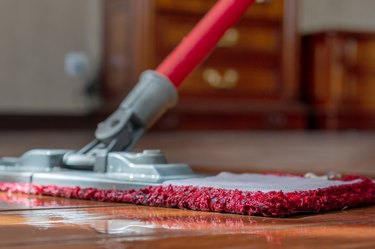
If your floors are sticky and you prefer to keep your home clean without chemicals or commercial products, take heart. There's a simple solution for cleaning dirty, sticky floors that make an unpleasant squelching noise when you walk on them. This problem can be alleviated with white vinegar like so many other household ills.
Sticky Wood Floor Cleaning
Video of the Day
Note that not all floor types should be cleaned with vinegar. Certainly, one would assume rugs couldn't be cleaned this way. It might be less obvious, though, that unsealed hardwood floors shouldn't be cleaned with vinegar.
Video of the Day
If you don't have a polyurethane or other clear coating over your hardwood, don't attempt to clean it with vinegar as doing so may damage the wood. Uncoated, unsealed hardwood soaks up everything, which means these floors are at greater risk of damage. Ideally, your hardwood should be coated. You can consider applying a linseed oil treatment every few years to keep the wood looking beautiful and help act as a moisture barrier.
According to Real Simple, coated and sealed hardwood floors can be cleaned with vinegar. To do so, mix 1 gallon of hot water and 1 cup of white vinegar in a bucket. Use a soft mop that won't scratch your floors, and always vacuum before you mop to remove debris. Never use red wine vinegar or balsamic vinegar; though, in a pinch, apple cider vinegar may be used.
Cleaning a Sticky Kitchen Floor
Other types of flooring, including tile, linoleum and laminate, can be cleaned with vinegar too. If you've been seeking a floor cleaner that doesn't leave residue, white vinegar is an excellent choice. Be sure that you don't use vinegar or a liquid of any kind on a flooring material that can't get wet, such as many older or lower-end laminates. If you're not sure if your flooring can be treated with liquids, consult the manufacturer before getting started.
To clean non-wood floors with white vinegar, mix 1 gallon of hot water and 1 cup of white vinegar in a bucket, just as you would for hardwood floors. You should ideally still use a soft mop if possible, but the texture of your mop isn't as critical as when you're caring for delicate hardwood floors. In the case of very dirty, sticky tiled floors, you may prefer a mop with a bit of a rough, spongy bottom to really get a deep clean.
You should still sweep or vacuum your floor before you mop with vinegar and water to remove debris. In fact, Merry Maids recommends that you vacuum high-traffic areas as often as every other day or at least once a week. Your kitchen would fall into this category. By keeping floors clean of dirt, dust and crumbs, you'll not simply push waste around when you mop.
Cleaning Very Sticky Messes
If you're faced with an extremely sticky mess, you may need to use a sponge and scrub by hand rather than using a mop. Though mops work wonders, they offer less of an advantage where body mechanics are concerned to clean up tough stuck-on messes.
You should wear rubber gloves if you plan to manually scrub with your water and vinegar mixture to avoid acidic vinegar hurting your hands. Then, prepare the same mixture and clean your floor thoroughly.